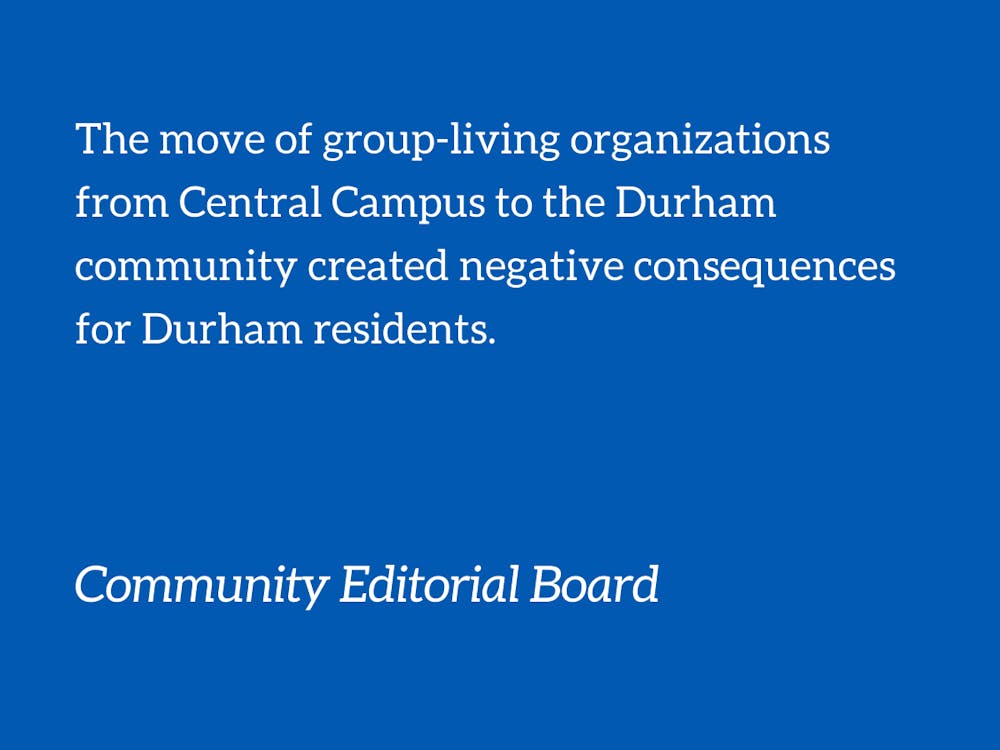In mid-February, Durham citizens created a petition to ban fraternities from Durham’s residential neighborhoods. Residents from the Tuscaloosa-Lakewood area campaigned to remove the five Alpha Delta Phi houses – a.k.a. “the compound” – on Chapel Hill Road. The list of complaints is expansive, describing the fraternities as “a public nuisance” that “violate noise ordinances, … permit the use of illegal drugs, … trespass on neighboring property, and otherwise disturb the peace…of the neighborhood.” How did members of Duke’s student body reach this level of incivility? More importantly, while rowdy behavior is expected from college students on campus, how did Duke allow this behavior to seep into Durham neighborhoods?
Most fraternities disaffiliated from Duke in early 2021 to create the Durham Interfraternity Council (IFC). No longer bound to Duke University’s policies and procedures, these organizations are free to behave and discipline based on their own judgment (or lack thereof). The Durham community’s complaints are illustrative of the consequences.
Duke students are inherently members of the Durham community. Thus, when members of the Duke community can’t behave respectfully on their own, the Duke administration has the responsibility to intervene.
However, Duke’s housing decisions within the past decade have been destructive to student organizations with dedicated live-in sections. The erasure of Central Campus in 2019 eliminated the on-campus space where students felt most comfortable partying. The causes of fraternity disaffiliation stem from Duke housing decisions as well. In the spring of 2020, the Duke administration postponed the annual Greek and SLG spring rush by one semester to the fall of 2020. The Durham IFC, which relies on yearly recruitment to sustain membership and funding, says that it was not consulted on changes to rush procedure before they were announced. On the other hand, the Duke administration claims that Greek organizations were one of the first groups they consulted on the matter. Nevertheless, it is clear that the Duke administration did not fully weigh the possible outcomes of these decisions. Without space to host parties on campus, Duke’s social organizations have moved their gatherings off-campus. Consequently, the responsibility of holding those organizations accountable for the resulting disruptions has fallen onto Durham residents.
Demolishing Central Campus was a justified action; the buildings were several decades old and infested with mold. It was not justified, however, to eliminate housing for the majority of residential student organizations without providing an alternative location. If these organizations–predominantly fraternities, sororities and SLGs–had a dedicated area on campus that was conducive to group living and celebration, they could continue partying in a more regulated, safe manner and location. Instead, they were placed in the Edens Quad, which is arguably one of the most isolated living spaces on campus and does not lend itself to large indoor or outdoor gatherings. Without adequate living spaces to support the organizations’ primary means of socialization and emphasis on community, off-campus is their only option.
The move of group-living organizations from Central Campus to the Durham community created negative consequences for Durham residents. It is the Duke administration’s responsibility to provide students with safe, monitored environments for gatherings. It is also their job to protect the Durham community from the worst effects of those activities.
What would this look like in the Duke and Durham community?
First, the Duke administration must make active efforts to mend its rift with Greek organizations. The IFC is better served when affiliated with Duke because it has access to greater resources and networks. Concurrently, Duke can better promote student safety when the organizations are on campus. The return of fraternities to campus would remove the most disruptive parties from the Durham community, which would address their complaints. The next step is to allocate housing specifically to Duke’s residential student organizations. Providing these organizations with spaces to host gatherings and live as a community on campus would promote inclusivity and safety both within the organizations and on campus. In addition to these changes, the Duke administration could also modify their party and alcohol policies, a proposal that has been highlighted in both DSG Presidential campaigns.
The Duke administration must do a better job of mindfully addressing the needs of both the Durham community and Duke student body. By bringing Greek life back to campus, the Duke administration can solve both at the same time. With more consideration on the effects–unintended or otherwise–of the new housing policies, Duke can serve as a place for students to have fun while avoiding damage to the Durham community. This sentiment aligns with the goal of QuadEx: to bring social life back to campus, making it safer and more inclusive. The Duke administration seems blind to the fact that QuadEx can coexist with group-living organizations such as Greek life and SLGs. Students and administration alike do not want unruly, offensive acts to happen on campus or in Durham neighborhoods. With this in mind, Duke must craft residential policies that enable students to have the fun and freedom they want–without disruption to the broader community.
The Community Editorial Board is independent from the editorial staff of The Chronicle. Their column runs on Tuesdays.
Get The Chronicle straight to your inbox
Signup for our weekly newsletter. Cancel at any time.

